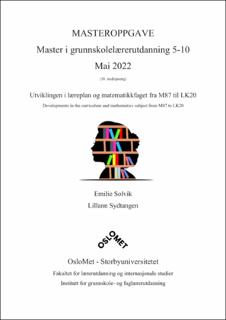| dc.contributor.advisor | Månsson, Anders | |
| dc.contributor.author | Solvik, Emilie | |
| dc.contributor.author | Sydtangen, Lilliann | |
| dc.date.accessioned | 2022-10-17T07:39:13Z | |
| dc.date.available | 2022-10-17T07:39:13Z | |
| dc.date.issued | 2022 | |
| dc.identifier.uri | https://hdl.handle.net/11250/3026279 | |
| dc.description.abstract | Læreplanen er skolens viktigste dokument når det gjelder undervisning. Planen beskriver
fagenes innhold, samt verdigrunnlaget for opplæringen. I 2020 kom den nyeste
læreplanreformen ut. Dette Kunnskapsløftet har et fornyet fokus på tverrfaglighet og
dybdelæring. Fagplanen består av kjerneelementer som gir en ny struktur. Hensikten med
denne studien er å undersøke læreplanens utvikling fra slutten av 80-tallet og fram til i dag.
Matematikkfaget er også i stadig endring. Undervisningen skal ha bakgrunn i læreplan, og det
som fremkommer i planen påvirker dermed hvordan faget endres. Siden læreplan på denne
måten styrer skolens retning, er et innblikk i utviklingen av planen viktig. Læreplanen skal
utvikles i takt med samfunnet, slik at elevene har den kunnskapen som trengs i framtiden. Vi
var derfor interessert i å studere innholdet i matematikkfaget, for å se om faget endres i takt
med resten av planen og samfunnets forventning.
Problemstillingen ble undersøkt gjennom en dokumentanalyse. Forskningsarbeidet vårt har i
stor grad vært knyttet til å sammenligne læreplanene med hverandre. Vi har brukt fagartikler,
tidsskrifter og evalueringer av læreplanen for å underbygge de forskjellene og likhetene vi
har funnet. Vi har sammenlignet både overordnet del, faglig forklaring og kompetansemål.
For å gi konkrete eksempler på de forskjellene vi fant, valgte vi avslutningsvis å se på temaet
algebra.
Resultatene pekte på en større endring i læreplanen. Måten kompetansemålene fremstilles i
dag, står i stor kontrast til innholdsmålene det tidligere ble tatt utgangspunkt i. Det har vært
en gradvis endring, hvor den største overgangen var fra L97 til LK06. Fokusområdene i
matematikkfaget har beveget seg bort fra tall og tallforståelse, og geometri, til algebra og
funksjoner. Temaer som problemløsning og utforsking gjennom uformelle metoder, som
blant annet inngår i algebra, er kompetanser som i dagens samfunn regnes som spesielt viktig.
I denne studien ønsket vi å sette et søkelys på utviklingen som har funnet sted de siste 35
årene i læreplan og matematikkfaget. Gjennom arbeidet med oppgaven har vi også
identifisert områder som kan vurderes i et videre arbeid. | en_US |
| dc.description.abstract | ABSTRACT
The curriculum is the school's most important document for teaching. The plan describes the content of the subjects, as well as core values for the education. In 2020, the latest curriculum came out. Kunnskapsløftet has a renewed focus on interdisciplinary and in-depth learning, and includes core elements as a new structure of the curriculum. The purpose of this study is to examine the curriculum's development from the late 1980's to the present day.
The subject of mathematics is also constantly changing. Teaching must have a background in the curriculum, and what the curriculum describes affects how the subject changes. Since the curriculum controls the direction of the school, an insight into its’ development is important. The curriculum must be developed with society to give the students the knowledge they will need in the future. Therefore, we were interested in studying the content of the mathematics subject to see if it changes in line with the rest of the curriculum and society's expectations.
We wanted to investigate this research question through a document analysis. Our research work has largely been related to comparing different curriculum throughout the years with each other. In addition, we used articles, journals, and evaluations of the curriculum to substantiate the differences and similarities we found. We compared the general introductions, subjects, and mathematical goals. To give concrete examples of the differences we found, we chose to analyze algebra.
Our results point to a major change in the curriculum though out the years. The way the goals are presented today contrast with the previous goals. There has been a gradual change, with the biggest transition from L97 to LK06. The focus areas in mathematics have moved away from numbers and geometry towards algebra and functions. Themes such as problem solving and exploration through informal methods, which are part of algebra, are competencies that are considered particularly important today.
In this study, we wanted to put a spotlight on the development that has taken place in the curriculum and the mathematics subject. Through the work on the thesis, we have also identified areas that can be considered in further work. | en_US |
| dc.language.iso | nob | en_US |
| dc.publisher | OsloMet - storbyuniversitetet | en_US |
| dc.subject | Læreplaner | en_US |
| dc.subject | Matematikkfaget | en_US |
| dc.subject | Algebra | en_US |
| dc.title | Utviklingen i læreplan og matematikkfaget fra M87 til LK20 | en_US |
| dc.title.alternative | Developments in the curriculum and mathematics subject from M87 to LK20 | en_US |
| dc.type | Master thesis | en_US |
| dc.description.version | publishedVersion | en_US |
